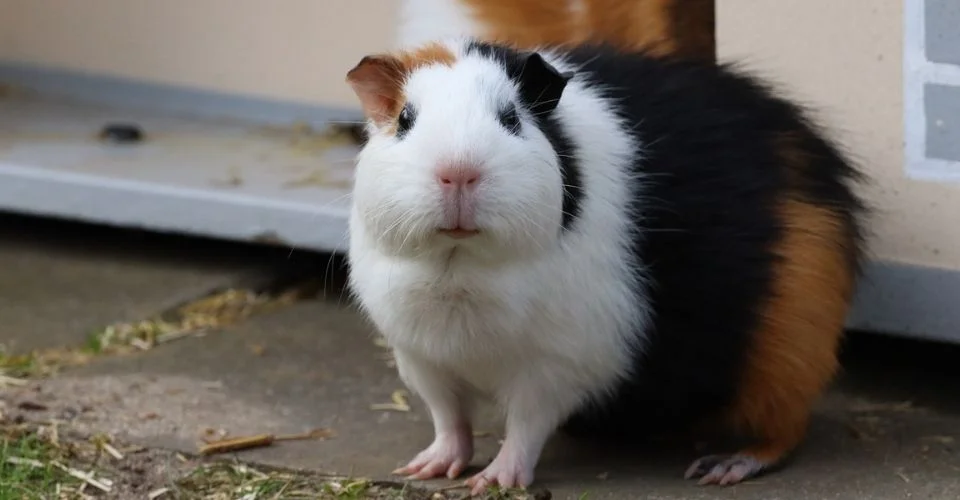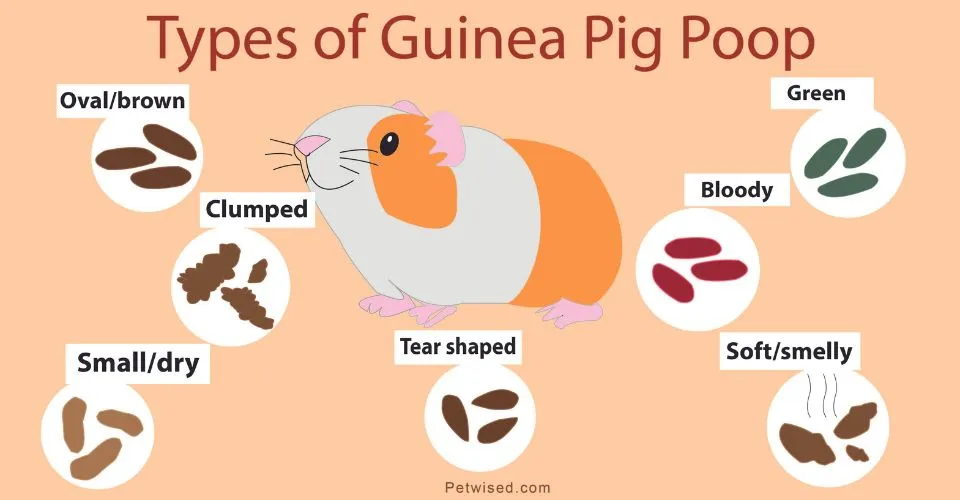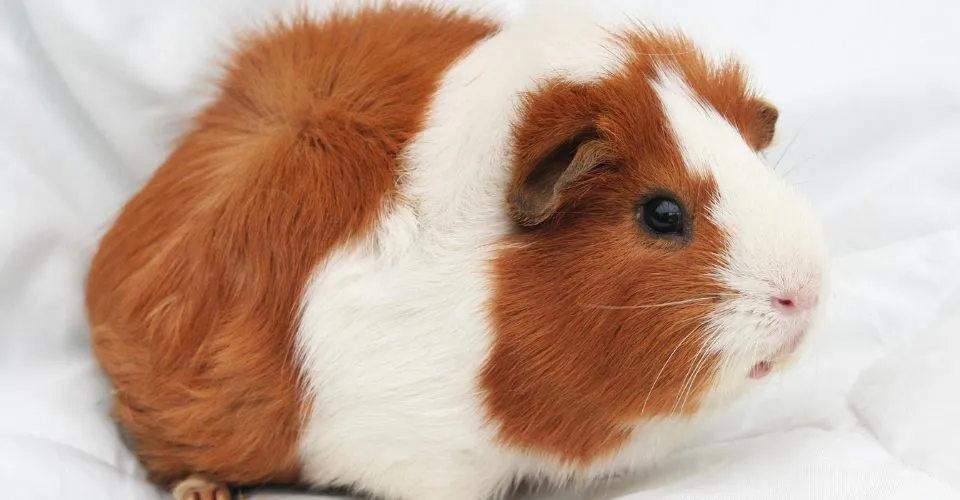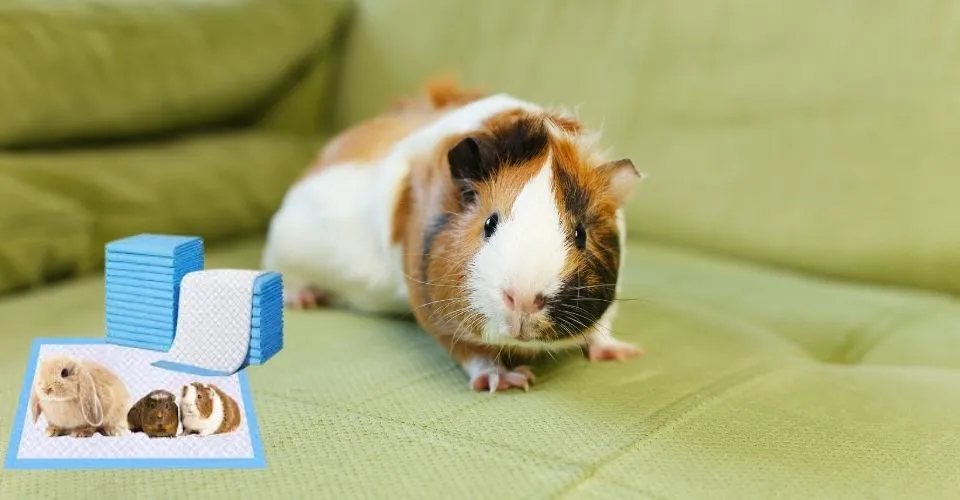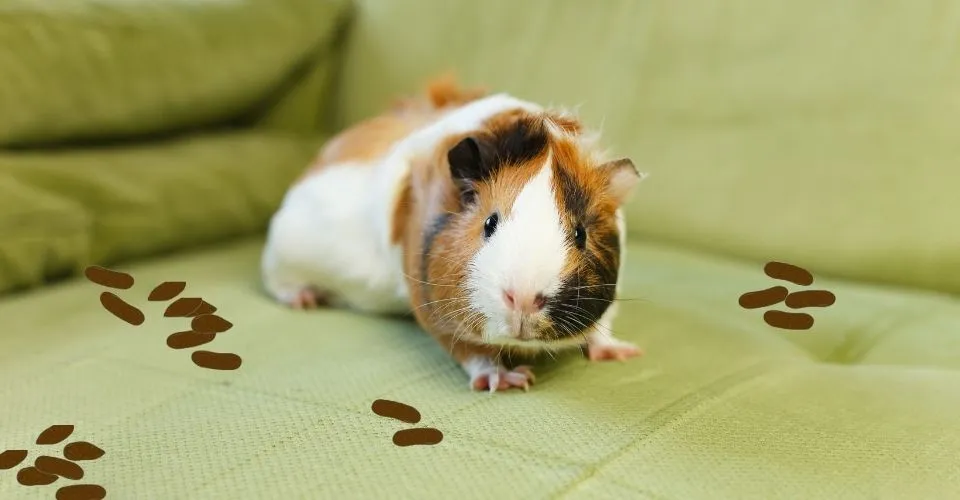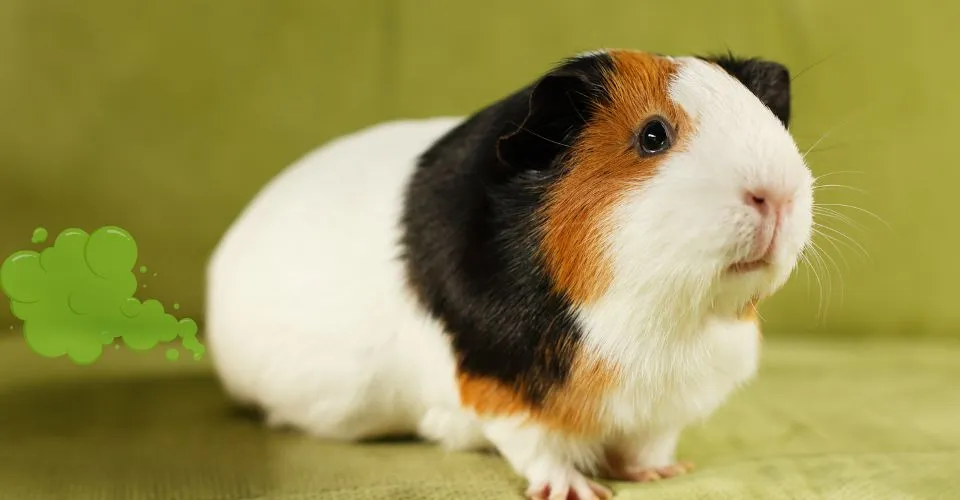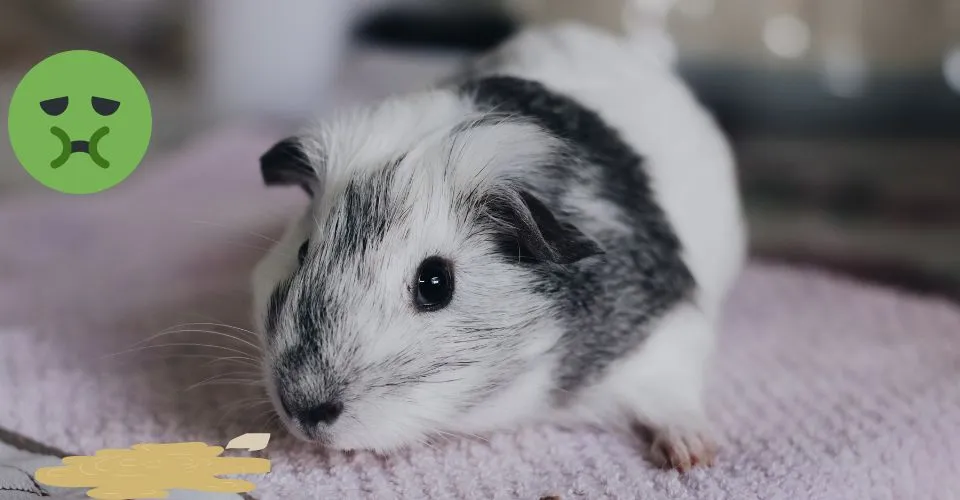Guinea pigs are prolific breeders. Guinea pigs go into heat (not periods) every two to three weeks for around 16 days. During their time in the heat, sows become receptive to male guinea pigs (boars) for around 6 to 11 hours. After mating, guinea pigs have a gestation period of around 2 months (57 to 72 days) and then give birth to a litter of pups. The guinea pig litter size varies between 1 to 8 pups; sometimes a sow could have even a bigger litter, however, usually, there are 2 to 4 babies in a guinea pig litter. If guinea pigs are allowed to breed freely, we would have scores of pups coming into this every hour.
That is why the average reproductive capacity of guinea pigs is controlled by housing male guinea pigs separately from female guinea pigs. Many guinea pig owners even spay and neuter their piggies to make sure that they don’t have an unplanned pregnancy at their hands. Even in houses where male and female guinea pigs are kept separately, guinea pig pregnancies happen. This is because you often get both male and female guinea pigs out of their cage together for floor time, and when you are not looking, they mate, and voila, your piggy friend is expecting.
| Did You Know! A neutered guinea pig could also impregnate a female guinea pig. Therefore, it is strongly advised that you wait for around 4 to 6 six weeks before putting the male guinea pig back in the cage. |
As the chance of guinea pig pregnancy is always there. Therefore, it is compulsory that every guinea pig owner familiarize themselves with the common signs of guinea pig pregnancy. So, they could identify guinea pig pregnancy at an early stage and provide the best possible care to the pregnant sow, and could make arrangements for the baby guinea pigs coming into this world.
Learning your guinea pig is pregnant, many questions might start popping into your head: When will be the big day? How long are guinea pigs pregnant? How to take care of a pregnant guinea pig?
The thought of guinea pig pregnancy could be overwhelming. But you need not worry as we are going to discuss all about the guinea pig gestation period.
Guinea Pig Gestation Period

The guinea pig gestation period is a fancy word for the length of the guinea pig’s pregnancy. Among pet rodents, guinea pigs have the longest gestation period, ranging between 59 and 72 days, depending on the number of babies in the guinea pig litter. Smaller litters tend to have longer gestation periods and large litters come out early into this world.
In the case of larger litters, by the end of pregnancy, the sow starts looking crazy large, as if she is going to explode. So, if one or two pups are growing inside of your sow, the pregnancy will most probably go beyond 70 days, and in case 4 to 6 or more pups are growing in your guinea pig’s belly, the pregnancy period is going to be as short as 60 to 65 days.
As most of the time, guinea pigs tend to have 1 or 2 pups in their first litter and 2 to 4 pups in subsequent litters, we can say that the first pregnancy is longer than subsequent pregnancies.
Baby Guinea Pigs
Unlike other rodents, gerbils, hamsters, and rats, baby guinea pigs are born quite developed. Their eyes are wide open, teeth erupted, and a coat fury. Though baby guinea pigs start munching on hard items like hay and guinea pig pellets in just two days, they should be allowed to nurse for around three weeks. As soon as the weaning process is completed, you should separate the male guinea pig from the mama guinea pig as well as the female siblings.
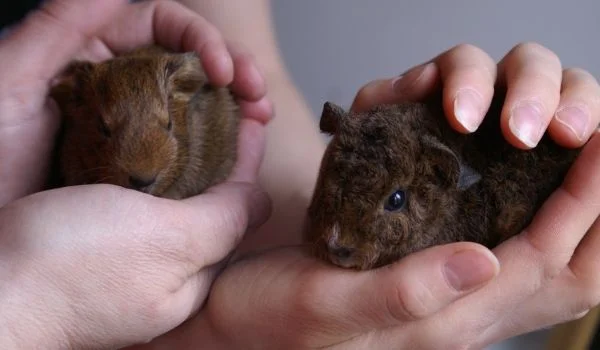
Is Your Guinea Pig Really Pregnant?
Before starting the countdown for the big day and getting excited about the new pups, you should first make sure that your guinea pig is really pregnant and not just fat. While guinea pigs start showing signs of pregnancy as soon as the second week of pregnancy, it is near impossible for novice guinea pig owners to notice. However, as pregnancy progresses, guinea pigs start showing more obvious signs of pregnancy.
| Pregnant Guinea Pig Signs! · Sow has been in contact with a boar · Increase food and water intake · Consistent weight gain · Fattening belly · Lumps and movement in the belly · Widening pelvis |
To learn more about pregnant guinea pig signs, check our guide on How To Tell If a Guinea Pig Is Pregnant?
Breeding Guinea Pigs
Pregnancies and complex and difficult for guinea pigs and around 20% of mothers die while giving birth. Therefore, guinea pig owners are advised not to breed their guinea pigs. Other than the high mortality rate of birthing mothers, it is quite difficult to find a good home for newborns. But if you have found an experienced veterinarian to help you throughout the guinea pig gestation and with the delivery process, and you can take care of the newborns, here are a few things to consider before breeding guinea pigs.
Ideal Age For Guinea Pigs To Get Pregnant
Where the age of male guinea pigs at the time of first breeding is less important, it is best if the female guinea pig is between 3 to 6 months old. At the maximum, female guinea pigs should be bred for the first time by the age of 7 months.
Breeding female guinea pigs after 7 months of age is extremely risky and it becomes impossible for sows to have a normal delivery as their pubic symphysis starts closing after 7 months of age and is fully closed by the age of 10 months, So, if your female guinea pigs older than 10 months have not had a litter, you should not even think of breeding her.
You should either get her spayed or keep her away from males. Because she could get pregnant but giving birth normally is an impossibility. Delivery will require a Cesarean section, which is extremely risky and often leads to the demise of the mother even if done by an experienced exotic veterinarian.
How Soon Can a Guinea Pig Get Pregnant After Giving Birth?
Guinea pigs can become pregnant shortly after birthing a litter of pups. As soon as 2 to 15 hours after giving birth, female guinea pigs go back into heat. This is known as postpartum estrus.
And if there is a male guinea pig around, your female guinea pig could become pregnant within 15 hours of birthing a litter. Thus, a female guinea pig could become pregnant again while breastfeeding baby guinea pigs.
Guinea Pig Pregnancy Risks
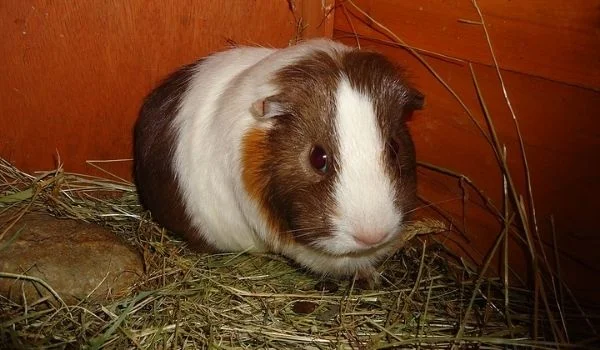
Pregnancy is complex for guinea pigs. While a guinea pig could have a normal pregnancy and deliver baby guinea pigs normally without experiencing any difficulty, it is not uncommon for guinea pigs to experience issues during pregnancy and while birthing. The most common guinea pig pregnancy health issues are discussed below.
Pregnancy Toxemia in Guinea Pigs
It is a serious condition that usually occurs in obese and overweight pregnant guinea pigs, mostly during their first or second pregnancy. Besides obesity, stress is a major factor predisposing sows to toxemia. Other factors include lack of exercise, fasting (not being fed adequately), heredity, and change in diet. Guinea pigs having larger litter are also prone to toxemia as most of what they eat is diverted into nourishing the babies and so the mother’s own body is getting very little nutrients.
The affected guinea pigs do not start showing signs until two weeks before birth or during the first week after birth. The common signs include poor appetite, reluctance to move, difficulty breathing, muscle contraction, incoordination, depression, and overall weakness.
Dystocia in Guinea Pigs
Dystocia is the inability/difficulty of a pregnant guinea pig to deliver baby guinea pigs normally. It is one of the most common birthing issues in guinea pigs and mostly occurs in guinea pigs that are bred after 7 to 8 months of age as their pubic symphysis is fused and there is no space for baby guinea pigs to pass. Similarly, guinea pigs may also experience difficulty delivering the pup if it’s too large.
If your guinea pig has been in active labor for more than 20 minutes or intermittently for over 2 hours, he is probably experiencing dystocia (difficulty delivering the baby). You should immediately get your guinea pig to a veterinarian. The sow would probably go under the Caesarean section.
Hypocalcemia
Hypocalcemia in guinea pigs occurs due to the low levels of calcium in the bloodstream. It usually affects pregnant or nursing guinea pigs. Calcium is crucial for the proper functioning of muscular and nervous systems in guinea pigs and thus its deficiency may cause dystocia (difficulty birthing) in guinea pigs, weakness, malocclusion (bad bites), twitching, and in severe cases may even lead to death.
Uterine Prolapse
Uterine prolapse is not common in guinea pigs but it may occur in old guinea pigs with large litter or large-sized pups. Uterine prolapse usually occurs when the cervix is dilated during delivery/abortion and one or both horns of the uterus protrude through the cervix and vulva.
The mama guinea pig remains at risk of many complications even after naturally giving birth. Therefore, it is crucial that you keep a close eye on baby guinea pigs as well as the mama guinea pigs even after birth. If you see any signs of sickness, you should immediately contact the veterinarian.

Interesting Guinea Pig Pregnancy Facts
Here are some weirdly interesting facts about pregnant guinea pigs:
1. Guinea Pigs Could Get Pregnant While Nursing
Female guinea pigs can go back into heat as soon as 15 hours after giving birth. So, if a male guinea pig is around, he would impregnate the nursing guinea pig as soon as she goes back on the heat. Even 3-week-old baby guinea pigs could impregnate their mother. Therefore, it is crucial that you house the nursing mother separate from male guinea pigs, including the dad boar. And as soon as the pups are weaned, you separate the male baby guinea pigs as well.
2. Though Baby Guinea Pig Are Born Fully Develop, They Need to Nurse
Nothing beats the mother’s milk. Besides fulfilling the nutritional needs of the baby guinea pigs, the colostrum also imparts immunity in pups. This is why baby guinea pigs that are born fully developed, able to munch on the commercial guinea pig food in a matter of few hours to 2 days after birth, need to feed on their mother’s milk for around 3 weeks for optimal health and immunity.
3. A Neutered Boar Can Impregnate A Sow
Neutering guinea pigs involves the removal of the testicle, so one would assume that it is impossible for a neutered guinea pig to impregnate a sow. But surprisingly, it is quite possible. If you are going to house a recently neutered male guinea pig with a sow, it would get her pregnant. This is because the procedure needs a few weeks to take effect. Therefore, to avoid unwanted pregnancies, you should keep your recently neutered guinea pig separate from female guinea pigs.
4. Sometimes Guinea Pigs Eat Their Babies
While in normal circumstances, a guinea pig would never eat its babies, in case of malnourishment or a stillborn pup, she could eat the stillborn to nourish her other pups. So, we know that guinea pigs might eat their babies out of necessity as a means of survival.
5. A 4-week-old female baby guinea pig Could Get Pregnant
Guinea pigs develop and mature really fast. Where female guinea pigs take around 4 to 6 weeks to mature sexually, male guinea pigs usually take around 8 to 9 weeks. That said, it is possible for both male and female pups to mature and be fertile even earlier. Therefore, you must separate male guinea pig babies from their mothers and female siblings as soon as they are weaned.
Final Verdict: How Long Are Guinea Pigs Pregnant?
Guinea pigs are pregnant for around 57 to 72 days (an average of 63 to 65 days) depending on the number of pups in the litter. Fewer babies mean a longer gestation period and vice versa. So, you can expect your first-time pregnant guinea pig (who has 1 to 2 pups) to be pregnant for 70 to 72 days.
